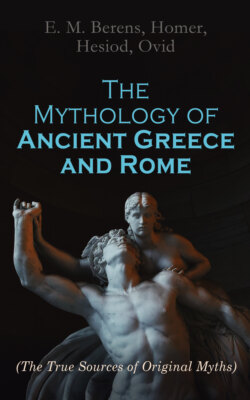Читать книгу The Mythology of Ancient Greece and Rome - Homer - Страница 88
На сайте Литреса книга снята с продажи.
FABLE III.
ОглавлениеThe sisters of Phaëton are changed into poplars, and their tears become amber distilling from those trees.
The Hesperian Naiads56 commit his body, smoking from the three-forked flames, to the tomb, and inscribe these verses on the stone:—“Here is Phaëton buried, the driver of his father’s chariot, which if he did not manage, still he miscarried in a great attempt.” But his wretched father had hidden his face, overcast with bitter sorrow, and, if only we can believe it, they say that one day passed without the sun.57 The flames afforded light; and so far, there was some advantage in that disaster. But Clymene, after she had said whatever things were to be said amid misfortunes so great, traversed the whole earth, full of woe, and distracted, and tearing her bosom. And first seeking his lifeless limbs, and then his bones, she found his bones, however, buried on a foreign bank. She laid herself down on the spot; and bathed with tears the name she read on the marble, and warmed it with her open breast. The daughters of the Sun mourn no less, and give tears, an unavailing gift, to his death; and beating their breasts with their hands, they call Phaëton both night and day, who is doomed not to hear their sad complaints; and they lie scattered about the tomb.
The Moon had four times filled her disk, by joining her horns; they, according to their custom (for use had made custom), uttered lamentations; among whom Phaëthusa, the eldest of the sisters, when she was desirous to lie on the ground, complained that her feet had grown stiff; to whom the fair Lampetie attempting to come, was detained by a root suddenly formed. A third, when she is endeavoring to tear her hair with her hands, tears off leaves; one complains that her legs are held fast by the trunk of a tree, another that her arms are become long branches. And while they are wondering at these things, bark closes upon their loins; and by degrees, it encompasses their stomachs, their breasts, their shoulders, and their hands; and only their mouths are left uncovered, calling upon their mother. What is their mother to do? but run here and there, whither frenzy leads her, and join her lips with theirs, while yet she may? That is not enough; she tries to pull their bodies out of the trunks of the trees, and with her hands to tear away the tender branches; but from thence drops of blood flow as from a wound. Whichever of them is wounded, cries out, “Spare me, mother, O spare me, I pray; in the tree my body is being torn. And now farewell.” The bark came over the last words.
Thence tears flow forth; and amber distilling from the new-formed branches, hardens in the sun; which the clear river receives and sends to be worn by the Latian matrons.
